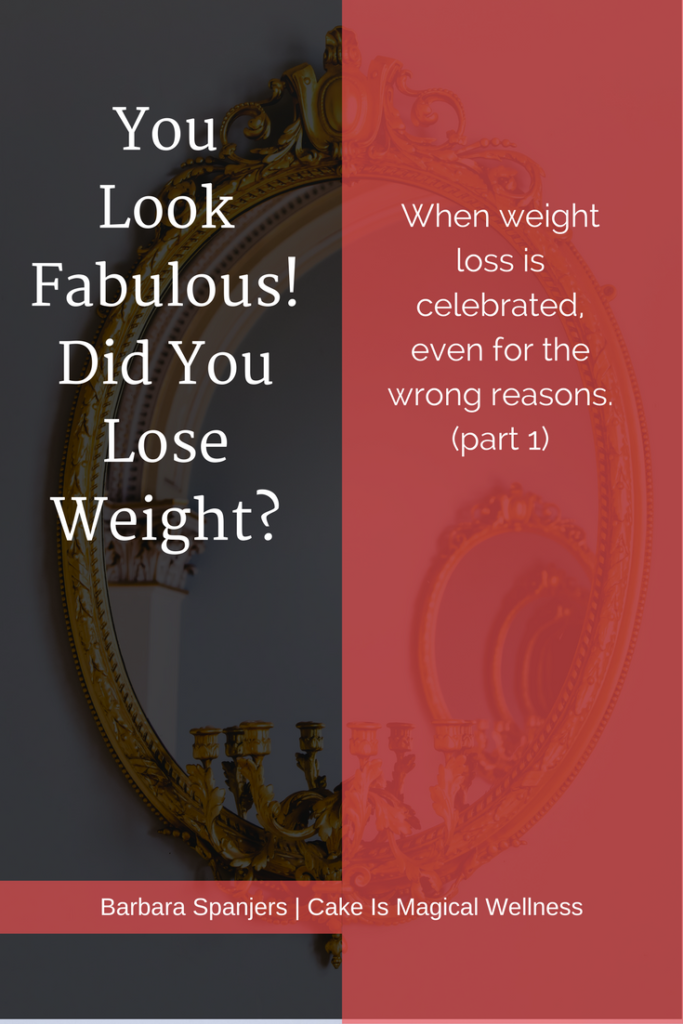- You Look Fabulous! Did You Lose Weight?
- Yeah, but I Lost Weight
When Weight Loss Is Celebrated, Even for the Wrong Reasons (part 1)

“Did you lose weight?! You look fabulous!” she cried to a passerby.
Some variation of this welcome was pretty common for my coworker. She used it as a form of social connection, because there were not that many people in the office. They could not all have been noticeably losing weight so often. (Or maybe they could, since yo-yo dieting is common.)
This time, though, the shrieking greeting had more intensity. And sure enough, the other person amplified the enthusiasm. The weight loss person described her new workout gym, where everyone is guaranteed to lose 20 pounds in a short time frame. Since she achieved that goal, the hundreds of dollars she paid upfront were refunded. (God forbid your body doesn’t respond on a dollars-per-pound chemistry, because that will cost you big bucks.)
Lots of people are like my coworker. “Did you lose weight?” is so common as a compliment, it seems to be a given that people will love to hear it.
Be careful, because that’s not always true.
It also is often not rooted in reality. “Did you lose weight? You look fabulous!” we say when we can’t put our finger on how someone appears different than we remember. “Did you lose weight? You look fabulous!” could stand in for whiter teeth, a new hairstyle, a summer tan, being well-rested, or wearing different clothing.
Not sure why someone seems different to you? Say, “Did you lose weight? You look fabulous!”
Haven’t seen someone for a while? Say, “Did you lose weight? You look fabulous!”
In my office that morning, the compliment went over well. Much high-fiving and high-volume accolades ensued.
This was an even exchange of admiration enthusiastically given and received.
It doesn’t always work out like that.
Sometimes, “Did you lose weight? You look fabulous!” backfires, even if the person you’re complimenting has actually lost weight. The underlying assumptions of complimenting weight loss are that the weight loss is deliberate, desirable, healthy, and admirable.
Here are some instances that challenge those assumptions.
- When someone emphasizes your weight loss, it begs the question of what they thought of you before. It implies that you aren’t worthwhile, or worthy of such positive attention, when you are larger. The fact that most people will regain the weight they lose (largely due to the body’s compensatory mechanisms) sets us up to feel even worse if/when we gain weight. This overt linking of self-worth to body size is one of the factors that can help an eating disorder take hold.
- Weight loss is not always done on purpose. It can be a side effect of something bad, like cancer. Or even stress. In this article, Eva Longoria described that when she was at her lowest point, people told her she looked great. Her weight loss was due to her bad mental state after her divorce. Weight loss aside, she probably didn’t look her best – but her weight loss trumped all, and people fawned over her.
- Weight loss is not always done in a healthy way. Besides focusing on appearance, a major assumption of weight loss is that it was done in a healthy way, and that it betters your health. In the short run, you can lose weight eating a bowl of cereal and a Snickers bar each day. (Been there, done that.) There’s nothing healthy there, either about the process or the outcome.
Preferably something other than their appearance, period. Our real value is under the exterior surface.






